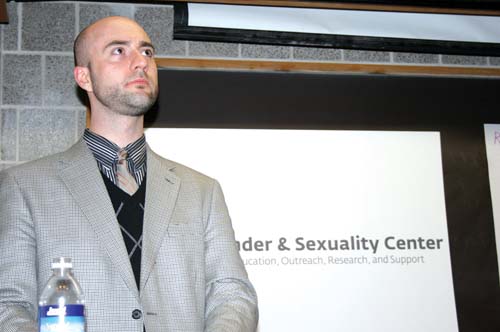The Gender and Sexuality Center (GSC; formerly the Office of GLBT Concerns) at the University of Illinois-Chicago (UIC) hosted a town hall March 12 to discuss its future directions and the search for a new director. The previous director, Patrick Finnessey, left in November and Liz Thomson was appointed interim director. Thomson has been keen to engage the larger LGBTQ community with the mission of GSC.

Thomson spoke with Windy City Times about her reasons for opening the event to the public. According to her, “[GSC has] a responsibility, since we are a state institution, and given UIC’s Great Cities program … we have a commitment and dedication to the urban area we are housed in.” While faculty, alumni and students are certainly GSC’s primary constituency, Thomson felt strongly that Chicago LGBTQ community people and organizations are also stakeholders in the future of GSC.
Approximately 30 people attended the town hall, in Lecture Room 140, in the Behavioral Sciences Building. C. Nathan Harris), GSC advisory board member, moderated the event. Harris said that the goal of the town hall was to consider what worked best at GSC as well as what needed improvement, how it functioned in relation to the campus and what a renewed GSC might look like. Not all attendees gave their full names, and a few did not identify themselves.
Asked to begin with what worked about GSC, nearly every attendee who spoke praised Thomson and Visiting Coordinator Moises Villada for their work. There was a great deal of praise for the Rainbow Resource Center, a room that serves as a safe meeting place as well as a library. But many, like Justin, felt that the center was also underutilized and untapped. Asked about what was useful, several spoke about the activities initiated by Pride (the UIC GLBT organization), and GSC’s Lunch and Learn events. Many of the issues raised had to do with logistics, such as insufficient publicity for GSC events.
The question of resources for GSC was a frequent topic. Several felt that it was severely understaffed, with the brunt of the work falling on Thomson and Villada and that this has its consequences. When either or both need to attend meetings on campus, the Resource Center has to remain closed.
The discussion turned to the question of the degree to which GSC should be engaged with academic research. Currently, it does not host visiting scholars or faculty research, and some audience members suggested that GSC could become a research center on the lines of CLAGS (Center for Lesbian and Gay Studies), housed in the Graduate Center of the City University of New York or the Beatrice Bain Research Group at the University of California, Berkeley. Francesca, a staff member at UIC, pointed out that this could meant that Midwestern scholars would not have to move to either coast to find support for research on gender and sexuality. Jacob Mueller suggested setting up a satellite office on the west campus, which is where the medical campus is located (the east campus houses mostly liberal arts schools) . Mueller pointed out that LGBTQ students and faculty were to be found outside the liberal arts.
Not everyone felt that the town hall was moving in new directions. One participant pointed out that despite Thomson’s assertion at the start that the discussion would be fluid, it was in fact falling too easily into neatly categorized topics like “outreach” and “research.” This participant also took issue with the setting and the format of the town hall, where a white man (Harris) led attendees, and which took place in a lecture hall that was not conducive to a participatory discussion.
The space was certainly a negative factor for many, who felt that the lecture room precluded actual conversations. Thomson acknowledged the limitations of the room and said that efforts would be made to have the next such meeting elsewhere. Despite her wish to have the wider Chicago LGBTQ community participate, only two attendees—Hector Salgado of Project Vida and a co-worker—were from a community organization. Thomson told Windy City Times that the location at UIC might have to do with the lack of community members present and that the idea of having the town hall at Center on Halsted, 3656 N. Halsted, had been floated as a possibility. But the concern there was that UIC students would not be inclined to make it to a North side location. “We could do something at a variety of community areas,” she said. Meanwhile, the plan is to continue “having smaller conversations culminating in a job search” for a new director.